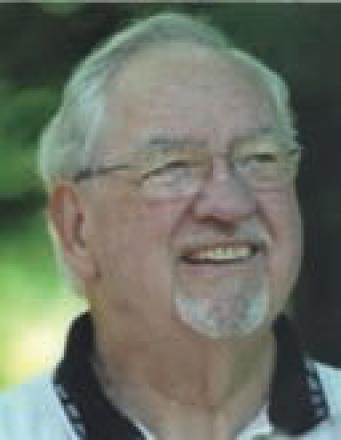The Fifties: Peace At Last
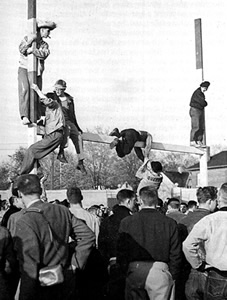
Fashions may change, professors go grey at the temples, musical hits come and go, but there’s a constant in a Queen’s student’s life. It’s that infectious and sometimes overly exuberant spirit that gets into the blood of just about everyone who attends the University, no matter what era.
“I remember marching down the streets of Toronto with gangs of Queen’s students, holding pieces of Varsity stadium over our heads,” says Richard Stackhouse, BCom’53. “Tearing down other teams’ goalposts was a sport at the end of the game and, of course, defending your own was also a sport.”
It may have been nearly 60 years ago, but Richard vividly remembers football games being on the wild side,with post-game goalpost removal being a standard practice despite official disapproval. “A lot of the wild parties coincided with football weekends in the fall. The stadium was where Mac-Corry Hall is today, and it was packed for football games.” In fact, so popular were the football games, he says trains were chartered to transport students to Montréal, Toronto or London to cheer on the Queen’s Golden Gaels. And of course wreak havoc on the opponent’s football field.
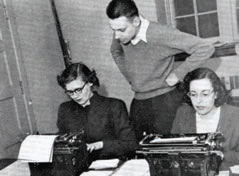 Assignments in progress High-spirited hijinks notwithstanding, the period of the late ‘40s and early ‘50s was generally a civilized time. Fewer than ten years after World War II, Richard remembers feelings of optimism and promise on campus. Students took their classes seriously and were formal in their attire: Male students wore long-sleeved shirts and ties to class and the women wore skirts and sweaters. Richard (Dick to his classmates) says classes were tough back then. Students worked on manual typewriters. “I typed my own thesis painstakingly. If you screwed up even one word, you had to retype the whole page.”
Assignments in progress High-spirited hijinks notwithstanding, the period of the late ‘40s and early ‘50s was generally a civilized time. Fewer than ten years after World War II, Richard remembers feelings of optimism and promise on campus. Students took their classes seriously and were formal in their attire: Male students wore long-sleeved shirts and ties to class and the women wore skirts and sweaters. Richard (Dick to his classmates) says classes were tough back then. Students worked on manual typewriters. “I typed my own thesis painstakingly. If you screwed up even one word, you had to retype the whole page.”
Several professors whose names grace campus buildings today were favourite professors back then. Richard recalls in particular Prof. William A. Mackintosh, who taught economics, and Prof. Alex Corry, who taught political science. Both became Principals of Queen’s and namesakes of the largest classroom and office complex on campus 20 years later. “They were interesting guys, and their courses were so popular they had to be given in Convocation Hall in the Theological College.”
“Football Games Were On The Wild Side, With Post-Game Goal-Post Removal A Standard Practice.”
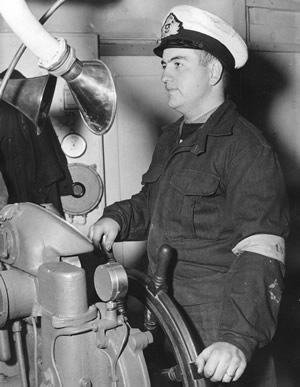 Richard Stackhouse at the helm, University Naval Training Richard also remembers his classmates’ reaction to a comment made by Liberal cabinet minister C.D. Howe when he spoke to the engineering class in 1953. “He told them that business leaders of the future would be engineers – and that pissed off the Commerce students.”
Richard Stackhouse at the helm, University Naval Training Richard also remembers his classmates’ reaction to a comment made by Liberal cabinet minister C.D. Howe when he spoke to the engineering class in 1953. “He told them that business leaders of the future would be engineers – and that pissed off the Commerce students.”
Because the Commerce program was still part of the Faculty of Arts at the time, there was quite a bit of intermingling between the business students and those from other arts departments. Although his own class started off with 70 students, there were only 22 left by the time he graduated. The other 48 didn’t all fail; they mostly migrated to other programs.
With the Korean War looming, Richard trained with the University Naval Training Division and spent summers with the Navy. He was so committed to this endeavour that he was prepared to leave university to fight had Canada become more involved in the war.
“I Typed My Own Thesis Painstakingly. If You Screwed Up Even One Word, You Had To Retype The Whole Page.”
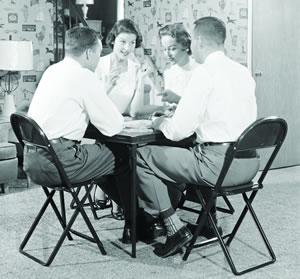 There were no men’s residences at Queen’s then, so he bunked under somewhat austere conditions with a family friend who was a widow. “It sure wasn’t wild living with her. She had a coal-burning furnace, and it was my job to stoke up the coal in the morning. I was delighted when she switched to an oil-burning furnace.”
There were no men’s residences at Queen’s then, so he bunked under somewhat austere conditions with a family friend who was a widow. “It sure wasn’t wild living with her. She had a coal-burning furnace, and it was my job to stoke up the coal in the morning. I was delighted when she switched to an oil-burning furnace.”
In addition to attending classes, he kept himself busy chairing the Arts Formal committee in his third year and helping out in fourth year, when the theme was ‘Gay Paree in ‘53, complete with a replica of the Eiffel Tower.
Richard, who wasn’t a drinker himself, notes that there was no drinking on campus. “Any beer drinking was done at one of the local hotels – the B.A., Beaup’s or the Tap Room, for instance. That was a popular pastime for a lot of guys.”
Light years before the advent of video games and Facebook, students were still able to find their diversions. Richard doesn’t recall seeing a TV on campus, but it was no hardship. “We spent our spare time playing bridge in the Students’ Union. That’s where I learned how to play the game. Some people went on to become bridge masters. We’d spend several hours a day playing bridge. I’m surprised they didn’t have a degree in it.”
- 1 of 2
- ›

